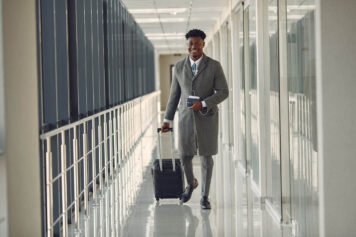Orbitz Worldwide Inc. has found that people who use Apple Inc.’s Mac computers spend as much as 30% more a night on hotels, so the online travel agency is starting to show them different, and sometimes costlier, travel options than Windows visitors see.
The Orbitz effort, which is in its early stages, demonstrates how tracking people’s online activities can use even seemingly innocuous information—in this case, the fact that customers are visiting Orbitz.com from a Mac—to start predicting their tastes and spending habits.
Orbitz executives confirmed that the company is experimenting with showing different hotel offers to Mac and PC visitors, but said the company isn’t showing the same room to different users at different prices. They also pointed out that users can opt to rank results by price.
Orbitz found Mac users on average spend $20 to $30 more a night on hotels than their PC counterparts, a significant margin given the site’s average nightly hotel booking is around $100, chief scientist Wai Gen Yee said. Mac users are 40% more likely to book a four- or five-star hotel than PC users, Mr. Yee said, and when Mac and PC users book the same hotel, Mac users tend to stay in more expensive rooms.
“We had the intuition, and we were able to confirm it based on the data,” Orbitz Chief Technology Officer Roger Liew said.
The sort of targeting undertaken by Orbitz is likely to become more commonplace as online retailers scramble to identify new ways in which people’s browsing data can be used to boost online sales. Orbitz lost $37 million in 2011 and its stock has fallen by more than 74% since its 2007 IPO.
The effort underscores how retailers are becoming bigger users of so-called predictive analytics, crunching reams of data to guess the future shopping habits of customers. The goal is to tailor offerings to people believed to have the highest “lifetime value” to the retailer.
Orbitz first confirmed Mac users’ preferences in October and began working them into the complicated mix of factors that determine its search results. The effect isn’t always obvious. In tests performed by The Wall Street Journal, search results for hotels in cities including Las Vegas, Orlando, Philadelphia and Boston were the same for both Macs and PCs. A New York search turned up more expensive hotels for Mac users, but only after the first 20 listed.
Other searches showed more significant differences. A Mac search for a hotel in Miami Beach for two nights in July displayed costlier boutique hotels on the first page of results, such as Sagamore, the Art Hotel and the Boulan South Beach, that weren’t displayed on the PC’s first page. Among hotels appearing in both searches, some pricier options (such as the $212 Eden Roc Renaissance and the $397 Fontainebleau) were listed higher on the Mac. Overall, hotels on the first page of the Mac search were about 11% more expensive than they were on the PC.
Similarly, hotels on the first page of results for Baton Rouge, La., appeared in different order for Mac and PC and were 13% more expensive in aggregate for the Mac search.
Rival travel sites Expedia Inc., EXPE -3.71% Priceline.com Inc. PCLN -2.30% and Travelocity, which is a unit of Sabre Holdings Corp., don’t use a person’s computer operating system when suggesting hotels, spokesmen said. Apple declined to comment.
Neil Sazant, president of Sagamore, reacted with a mix of admiration and concern to the algorithm. “That’s incredible, but I wouldn’t want to miss out on PC users,” he said. Mr. Sazant says about 15% of rooms at the 93-room hotel are booked through a mix of online sites like Orbitz and that appearing on the first page of results is important in those searches.
Orbitz’s chief executive, Barney Harford, has made data mining a priority. Shortly after joining the company in 2009, the former Expedia executive opened a small office in Sunnyvale, Calif., and recruited statisticians with backgrounds from eBay Inc. EBAY -2.32% and Google Inc. GOOG -1.92% for a new analytics team.
Digging into the data, the team found some hotels were far more likely to be booked by Mac users. Nearly half of bookings on Orbitz for the Public Chicago—a high-end Chicago hotel that boasts features such as “lobby socializing”—come from Mac visitors, said Mr. Liew of Orbitz.
Erica Spayd, a store designer from Queens, N.Y., uses Orbitz to reserve flights and hotels from time to time using her MacBook Pro. “It’s clever,” the 31-year-old said of Orbitz’s Mac targeting. “As long as there’s an option to sort by price I’m fine with it.”
Orbitz said the effort to incorporate Mac vs. PC distinctions is still in its formative stages and isn’t evident across the site. Other factors have more influence over results, Mr. Liew said, including a user’s location and history on the site, as well as a hotel’s overall popularity and promotions. Still, he said, use of a Mac can influence results.
Apple users already stand out as big spenders. Nearly half of retailers in a recent study by Forrester Research and Shop.org said users of tablets—a large majority of which are iPads—tend to place bigger online orders than users of laptops or desktops. Shoppers on Apple devices like iPhones also outspend shoppers using Android or BlackBerry devices, accounting for half of all mobile purchases, according to International Business Machines, which tracks data from retailers.
Fashion site Rue La La pays close attention to iPhone and iPad users, who account for 75% of all of its mobile orders, said CEO Ben Fischman.
Companies are just starting to look at whether users of Macs, who make up just 9.8% of the U.S. personal -computer market, according to market research firm Gartner, might exhibit similar characteristics.
The average household income for adult owners of Mac computers is $98,560, compared with $74,452 for a PC owner, according to Forrester.
Eventually, Orbitz may start to test if Mac users have identifiable preferences for car rentals and flight bookings. “It would be nice to say they book more Porsches, but at this point we’re only looking at hotels,” Mr. Yee said.
Source: WSJ


